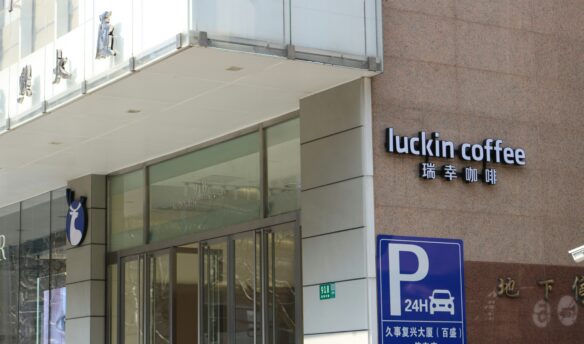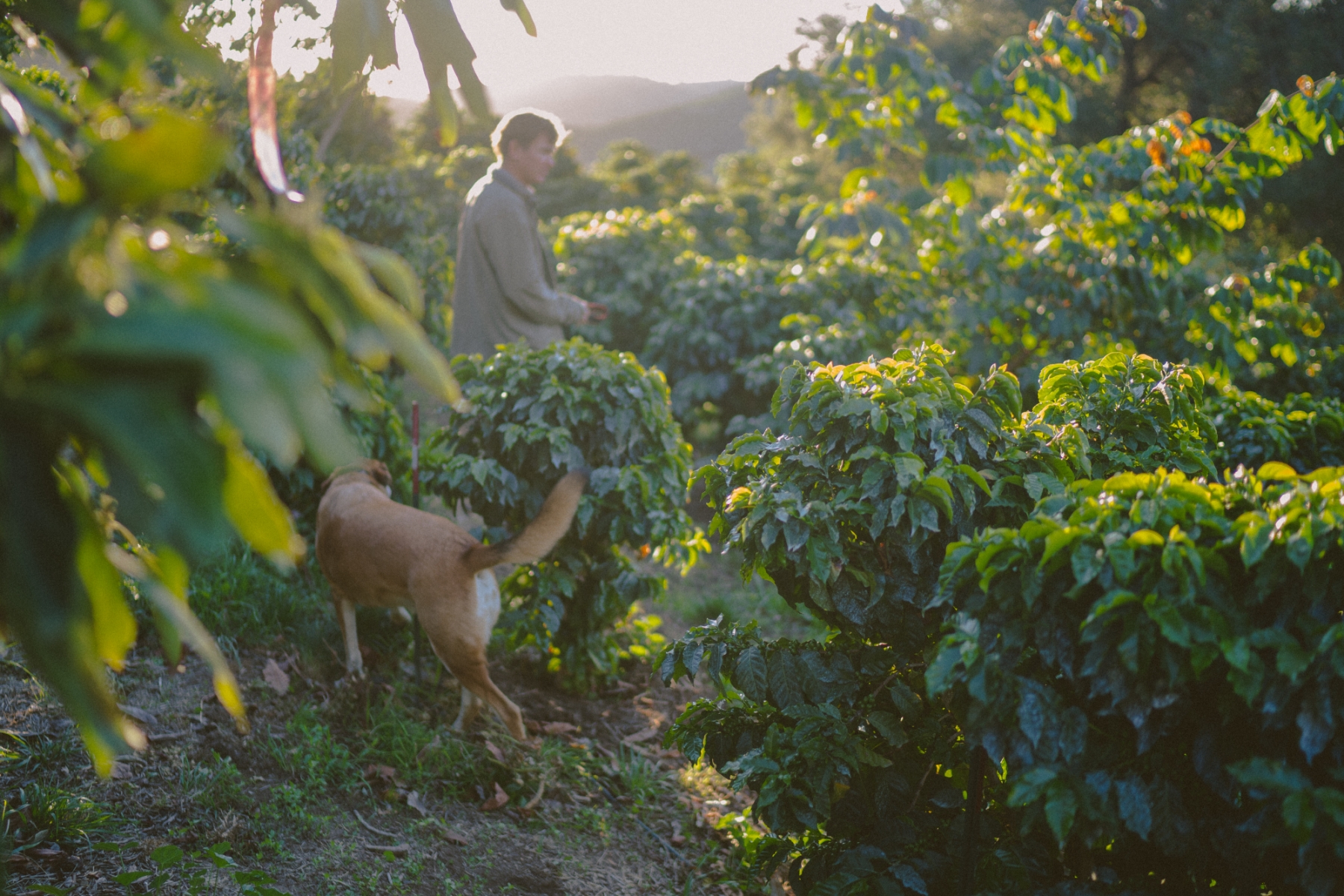There can be only one death-themed coffee brand. Plus, how post-harvest processing can improve underripe coffee, and Blue Bottle Coffee achieves carbon neutrality—but does that mean anything?
‘Brazil Study Promotes Closed Fermentation to Boost Quality of Unripe Coffees’ – via Daily Coffee News
Coffee quality is tied to ripeness, and to ensure the highest quality, coffee farmers try to pick cherries at their peak ripeness. But in countries like Brazil, mechanized harvesting is becoming more common, with machines stripping entire trees of fruit. This means ripe and underripe cherries often get mixed together, which negatively impacts quality.
But what if there was a way to process underripe cherries so they taste as good—if not better than—perfectly ripe ones? A recent study found that fermentation might hold the answer.
A group of researchers at Brazil’s Federal University of Uberlândia experimented with fermentation methods to improve the quality of underripe coffee cherries. Their methods took underripe coffees up to a quality level comparable to specialty coffee standards.
For the study, published in the journal Food and Bioprocess Technology, researchers used self-induced anaerobic fermentation (SIAF) to process a mix of ripe and underripe cherries. SIAF is a technique that involves sealing cherries in an airtight environment to kick off the fermentation process (without removing oxygen—the fruit produces carbon dioxide, displacing oxygen). Cherries were hermetically sealed in 200-liter barrels for up to 96 hours after harvesting. The researchers added microorganisms to inoculate certain batches.
Specifically, the researchers looked at samples of the Arara variety, a disease-resistant coffee variety developed in Brazil. Arara has been popular among farmers for its productivity and cup quality.
When Q graders evaluated the processed samples, the findings defied expectations. Both ripe and underripe coffees scored above 80, the threshold to be considered specialty grade. In some cases, the underripe lots scored higher than the ripe ones.
“Contrary to the conventional view that immature beans are detrimental to coffee quality, results revealed that, under controlled fermentation conditions, immature beans can enhance the sensory characteristics of the beverage, resulting in profiles comparable to or even superior to those of coffees made exclusively from mature beans,” the authors wrote.
Read the full story on how fermentation can transform coffee here.
‘Verve Coffee To Pay Nearly $200,000 to S.F. Workers Over Health Fund Violations’ – via the San Francisco Chronicle
Verve Coffee Roasters has agreed to pay more than $180,000 after violating a local law that requires employers to pay for certain employees’ health benefits. The settlement will go to current and former staff at one of the California-based company’s San Francisco locations.
As St. John Barned-Smith reports for the San Francisco Chronicle, workers documented a series of healthcare violations before notifying the San Francisco Office of Labor Standards Enforcement. An audit determined that the company failed to pay appropriate health expenditures to 33 current and former employees between July 2022 and June 2025.
“Without our organizing, Verve would likely have never paid what we were owed,” Annika Mikk, a barista at the Market Street location, said in a statement. Workers from three Verve locations in Santa Cruz and San Francisco unionized with United Food and Commercial Workers Local 5 in September.
“These baristas didn’t just secure justice under the law,” said Jim Araby, a spokesperson for UFCW Local 5. “They helped spark a movement for dignity, equity, and voice in the coffee industry.” The union is working with Verve to negotiate a first contract.
“The audit was an amicable, interactive and cooperative process,” Verve said in a statement. “We support the outcome as determined by the City of San Francisco. Our people and our culture are the center-point of who we are and that will never change.”
Read more on how Verve’s healthcare settlement here.
‘Death Wish Coffee Files Trademark Infringement Suit Against Liquid Death’ – via FoodBev Media
Death Wish Coffee is suing canned water company Liquid Death for trademark infringement to protect its death-themed branding.
This isn’t the first time Death Wish has filed a lawsuit against other macabre-sounding brands. In 2023, the roaster and online retailer filed suit against roaster Death Before Decaf, after the latter attempted to extend its Australian trademark to the United States. The same year, Death Wish sued Death Hell Coffee, also for trademark infringement.
The suit against Liquid Death was filed on October 7 and claims that the beverage company is angling to launch a line of coffee products with plays on the word death, like “Deathuccino.”
Death Wish hopes to stop Liquid Death from “using any ‘Death’-formative marks in connection with its coffee products,” Yates reports. The coffee company also seeks damages and for Liquid Death to cover legal fees.
In the suit, Death Wish noted that the two brands have previously coexisted without issue, but entering the coffee sector could mean customers might conflate the two brands. “Death Wish’s legal filing states that the similarities in trade dress and branding could lead to consumer confusion, particularly as both brands may appear on retail shelves side by side,” Yates writes.
In response, Liquid Death said it has no plans to launch a ready-to-drink coffee product (although Yates does report Liquid Death applied for a trademark on the words “Liquid Death” and “Liquid Death Deathuccino”). They also noted that “we don’t believe any one company can legally own the word DEATH regardless of how it’s used.”
Read more on the Death v Death lawsuit here.
More News
‘Filipino Coffee Shops Are Pushing Fun Little Coffee Drinks Forward’ – via Eater
‘Kenya’s Coffee Farmers Go Digital To Meet EU Deforestation Rules’ – via Ag Tech Navigator
‘JDE Peet’s Opens Revamped Innovation Lab at Utrecht Factory’ – via Daily Coffee News
‘TIME Best Inventions Recognises Global Coffee Program’ – via Global Coffee Report
‘La Marzocco And Victorinox Team Up For Coffee’s Own Swiss Army Knife’ – via Sprudge
The Week in Corporate Coffeewashing
Last week, Blue Bottle Coffee announced that it achieved carbon neutrality for the calendar year 2024. The Nestlé-owned company said that it plans to “build on this legacy by scaling regenerative agriculture within its coffee value chain.”
The announcement follows a plan Blue Bottle laid out in 2021 to reach carbon neutrality by 2024. In 2023, the global coffee chain shared a “high-level roadmap” to achieve this goal by reducing emissions in its green coffee sourcing, cafe operations, and overheads.
In a press release announcing its achievement, Blue Bottle said that it reduced its greenhouse gas emissions (GHG) intensity by 18.4% compared to 2018. Emissions intensity is a way of calculating the volume of emissions created per unit, and allows companies to track their emissions as they grow. For Blue Bottle, the calculation was the amount of carbon dioxide equivalent (CO2e) created per the production and consumption of 1kg of coffee in its various markets.
Changes like buying renewable energy, serving oat milk by default, and promoting remote work meant that the company’s emissions intensity fell between 2018 and 2024 even as the company expanded to new markets in Asia. However, total emissions rose from just under 24 million kg of CO2e in 2018 to just over 37 million kg of CO2e in 2024.
To reach carbon neutrality, Blue Bottle said that remaining emissions were compensated for “by purchasing high-quality carbon removal credits focused on nature-based climate solutions.”
“Achieving carbon neutrality is both a milestone and a mandate,” said Karl Strovink, CEO of Blue Bottle. “It confirms what’s possible when we take clear, collective action.”
While emissions reduction goals are laudable, it is impossible for a coffee company to reduce its emissions to zero. Coffee is a carbon-intensive beverage, from production and shipping to roasting and brewing. That’s where purchasing carbon removal credits, or offsets, often come in: Carbon offsetting is popular within the coffee industry and other sectors where emissions are unavoidable.
Carbon offsetting is the practice of balancing emissions in one place by paying for a project that removes or captures a proportional amount of emissions elsewhere, like planting trees or building a wind farm. Carbon credits are permits that allow the owner to emit a certain amount of GHGs based on those offsets.
Despite its popularity, researchers and environmental organizations have repeatedly criticized offsetting: Greenpeace has called the practice “a scam,” while a 2024 analysis by the nonprofit watchdog Corporate Accountability found that big companies like Disney, Volkswagen, and Nestlé had purchased millions of carbon credits that were “likely junk.”
Beyond the Headlines
‘Beyond Malabar: Indian Coffee Comes Into The Spotlight’ by Jenn Chen
‘The Drink That Americans Won’t Give Up Without a Fight’ by Ellen Cushing
‘Finding Coffee in Chaos: Strategies for Roasters as US Tariffs Sink In’ by Nick Brown








